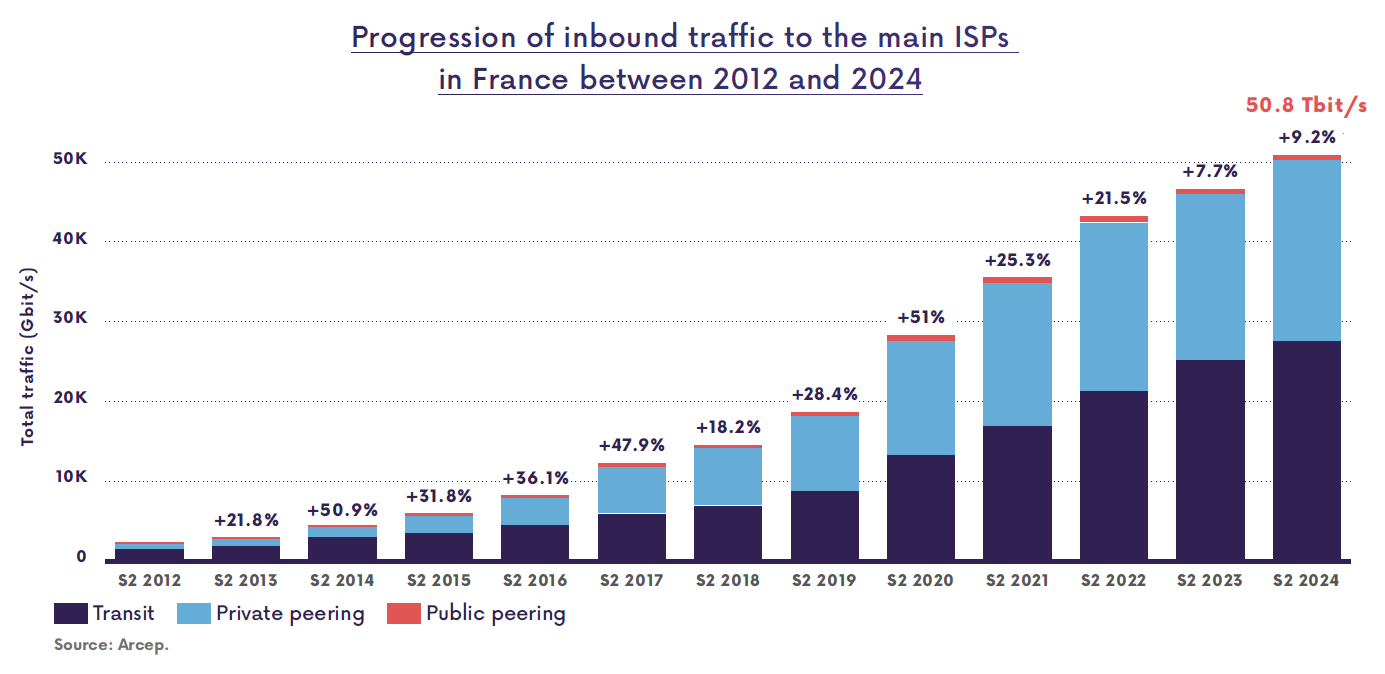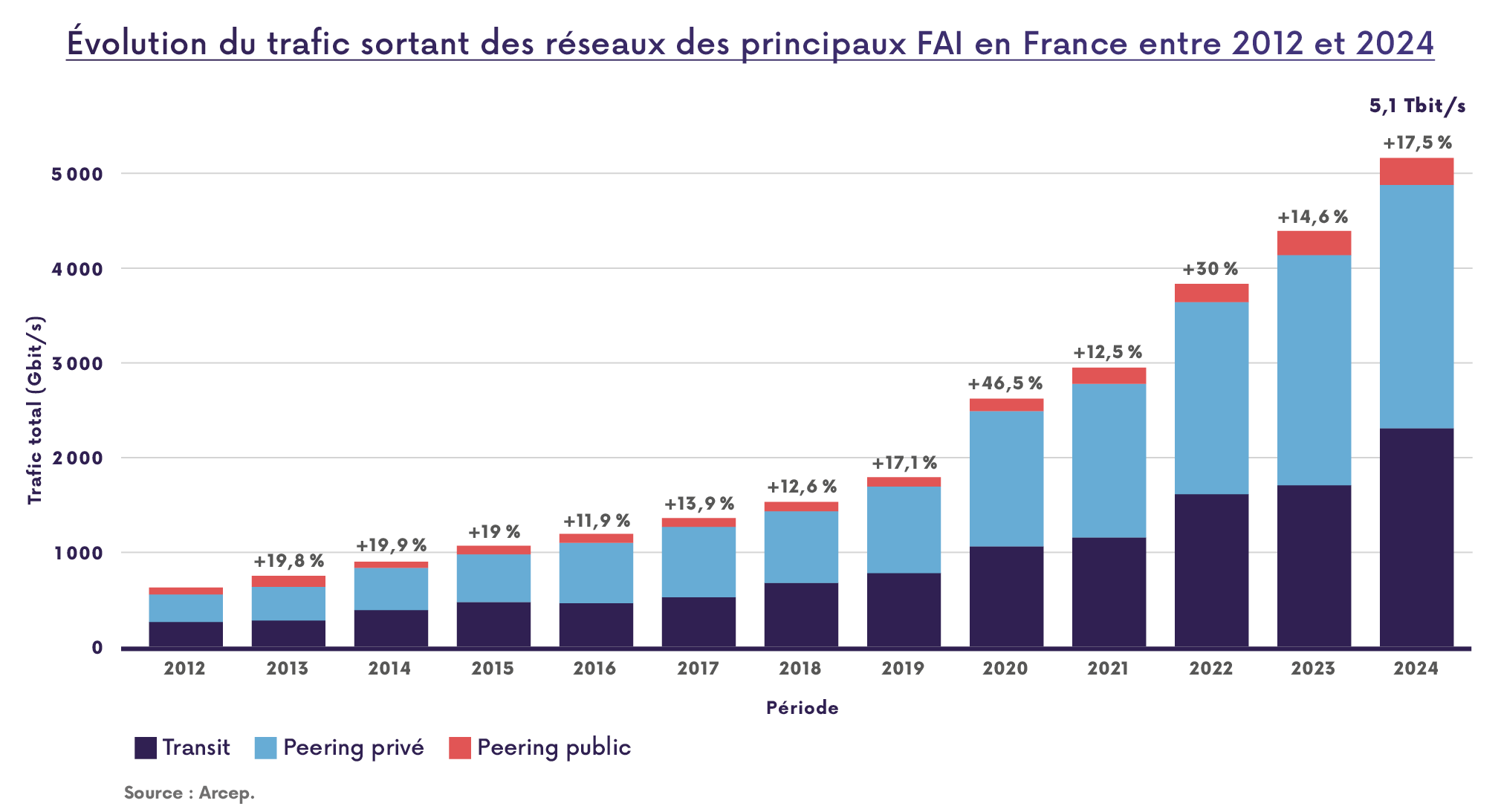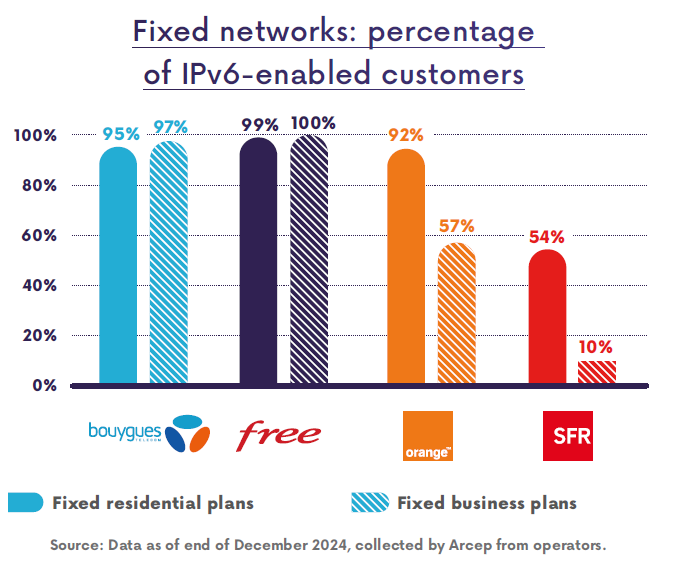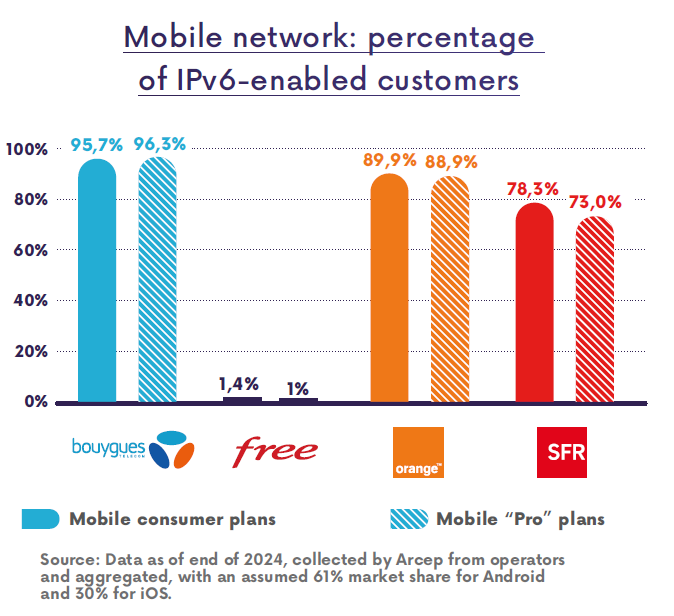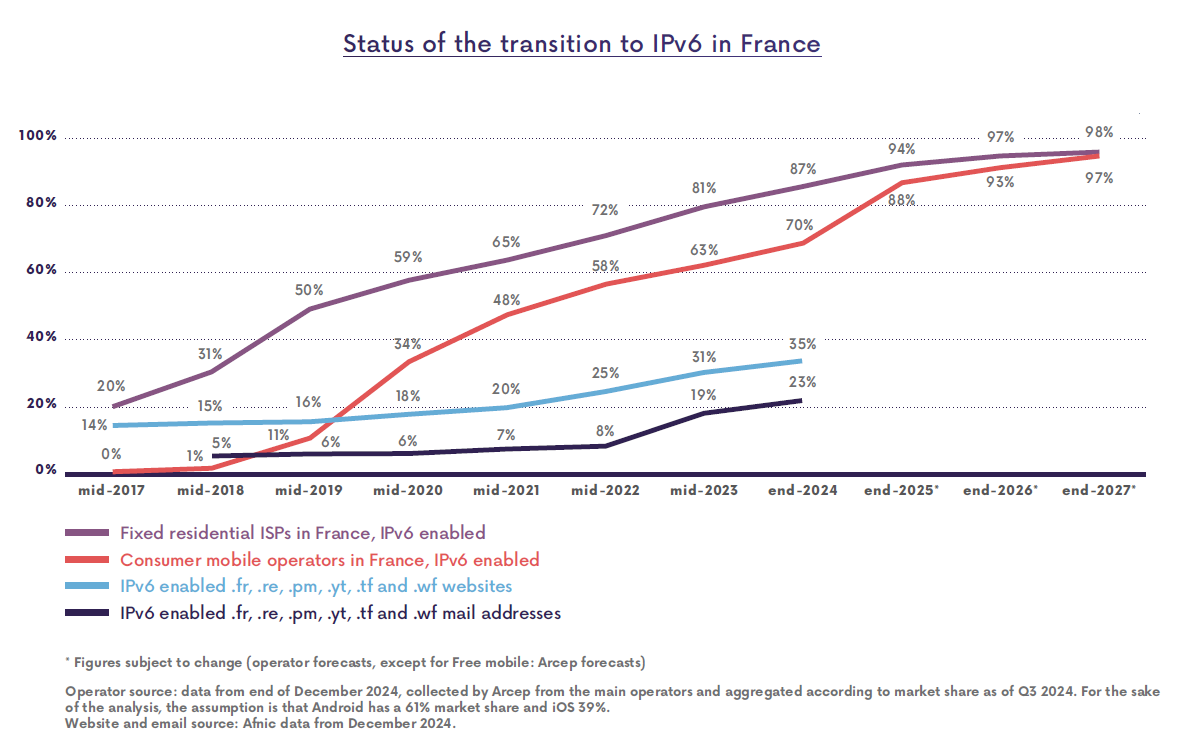Today, Arcep is publishing the 2025 edition of its Report on the State of the internet in France. At a time when 94% of people in France call themselves “internet users”[1], one of Arcep’s key responsibilities is ensuring that the internet continues to run smoothly. This third volume of the Authority’s annual report, which is submitted every year to Parliament, provides a detailed account of the actions that Arcep has taken to promote and safeguard an open, high-performance and sustainable internet. It also includes heretofore unpublished data on network interconnection and the transition to IPv6.
Interconnection: decreased rate of traffic growth appears to be taking hold
At the end of 2024, inbound traffic on the networks of the country’s largest ISPs reached 50.8 Tbit/s, marking a 9.2% increase YoY. As with the 7.7% growth in 2023, this increase was significantly below what was recorded in previous years (See graph: “Progression of inbound traffic on the networks of the main ISPs in France between the end of 2012 and end of 2024”). Five Big Tech companies – Netflix, Akamai, Google, Meta and Amazon[2] – together generated 47% of this traffic (compared to 53% last year).
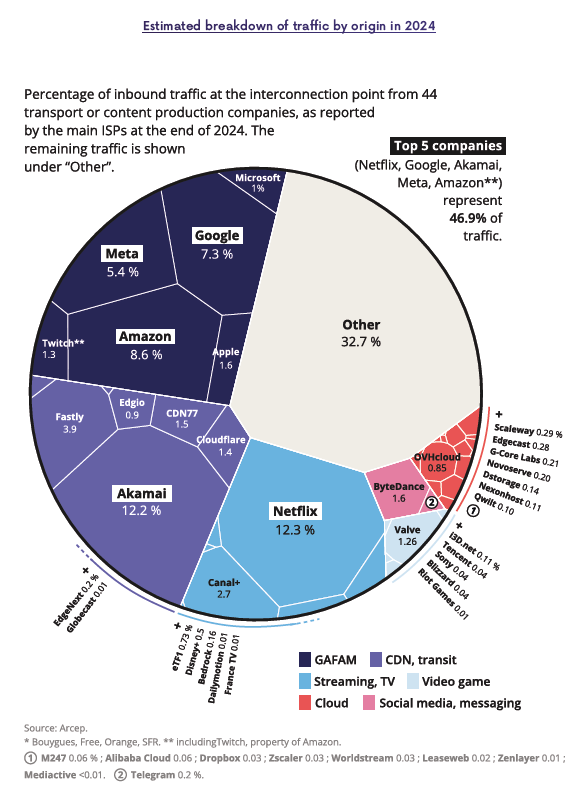
IPv6: the consumer internet’s transition to IPv6 in France is expected to be complete by 2027; France became the transition’s global leader in June 2025
With the exhaustion of IPv4 addresses, it has become crucial to adopt the IPv6 protocol to guarantee that every device is able to connect to the internet. The Barometer of the transition to IPv6, which is produced based on data from Arcep and Afnic, provides the ability to track stakeholders’ efforts in this area. The transition continued to make progress in 2024, with 87% of fixed access customers and 70% of consumer mobile customers IPv6 enabled. Operators’ forecasts indicate that the consumer internet network’s transition will be complete by 2027. In June 2025, France rose to the top of the global IPv6 connectivity rankings[3]. But there is still work to be done, including finalising the activation of IPv6 on operators’ business networks and accelerating the pace of hosting companies’ and content providers’ migration.
Net neutrality: 10th anniversary of the Open Internet Regulation!
As the European regulation celebrates its 10th anniversary, Arcep is taking stock of the actions it has taken to safeguard net neutrality. The regulation has proven to be an effective and resilient instrument that has stood the test of time for preventing discrimination between content, and guaranteeing internet users’ freedom of choice and action. One key area of focus for the Authority in 2024 and 2025, along with its counterparts within BEREC, has been applying this framework to the development of network slicing solutions for differentiated connectivity. This work confirmed that there was no incompatibility between these slicing technologies and the Open Internet Regulation. Arcep continues to maintain an ongoing dialogue with operators to ensure that newly released products comply with European obligations.
Generative AI and the future of the internet: threats and opportunities
In 2024, Arcep committed to bringing structured deliberations to public debates on what is still a largely unexamined topic: the impact of generative AI on the internet. By becoming new interfaces for accessing internet content, generative AI models can influence users’ freedom of choice, and undermine innovators’ and startups’ ability to offer services and content online. In its “Ambition 2030” strategy, Arcep announced the upcoming publication of a deliverable containing analyses and recommendations for reconciling the development of generative AI and safeguarding an open internet where innovation can flourish. This work draws on interviews with stakeholders from the ecosystem and civil society, and on collaboration on this topic with the French government’s centre of expertise on digital platform regulation (PEReN), which began in 2025.
Cloud, data, platforms: Arcep continues to work on opening up digital ecosystems
Adopted in May 2024, the Law on safeguarding and regulating cyberspace (SREN Act) entrusts Arcep with new regulatory powers over the data economy and cloud computing. Pursuant to Europe’s Data Governance Act, Arcep became the French regulator for data intermediation service providers and, to this end, opened up vendor notification and approval windows, as soon as the SREN Act came into force. In preparation for the EU’s Data Act, Arcep was tasked with establishing a pricing and technical framework for regulating cloud services, and held a public consultation in October to lay down initial guidelines. The goal for both of these mandates: to foster the development of the data economy and innovation, as well as cloud service users’ freedom of choice.
At the European level, Arcep is an active contributor to the work that BEREC is doing on regulating gatekeeper platforms under the Digital Markets Act (DMA). Among other things, it co-chaired the Body’s work on the interoperability of messaging apps.
New building block for achieving digital sustainability: the General Policy Framework for the Ecodesign of Digital Services
With the 4th edition of its annual “Achieving digital sustainability” survey, and the study published with Arcom and ADEME on the environmental impact of audiovisual service use, Arcep confirmed its commitment to environmental measures. According to the published indicators, digital technology’s environmental footprint is growing in several areas, not least due to the resources consumed by data centres.
Arcep is also developing tools to support stakeholders’ efforts to reduce ICT’s impact on the environment, including the General Policy Framework for the Ecodesign of Digital Services that includes 78 factsheets for achieving more sustainable solutions. In May 2025, the launch of the Digital Ecodesign Stakeholder Forum at Arcep’s offices created a space for dialogue and sharing experiences, to assess the process of putting this Framework into practice and to ensure that it keeps pace with realities in the field, and with technological and environmental developments.
Associated documents:
- 2025 Report on the State of the internet in France
- Barometer of data network interconnection
- Barometer of the transition to IPv6
- “Ambition 2030” strategy
- Slides presentation (in French)
- Video of the presentation (in French)
- Presentation in audio (in French)
Arcep at a glance
The Regulatory Authority for Electronic Communications, Postal Affairs and Print Media Distribution (Arcep), a neutral and expert arbitrator with the status of independent administrative authority (IAA), is the architect and guardian of internet, fixed and mobile electronic communications, postal and press distribution networks in France.
An annual report in three volumes: three facets of Arcep’s actions
In accordance with the Independent Authorities Act (Loi sur les Autorités administratives indépendantes, AAI) adopted in January 2017, every year Arcep publishes its annual report in three volumes:
Volume 1:“Arcep and regulated markets”, published on 27 June (in French), provides an update on Arcep’s responsibilities, actions and decisions in 2024. It also details Arcep’s European and international activities, which have contributed to the construction of European regulation, and the global reach of French electronic communications regulation.
Volume 2: “Regulation in support of connected territories”, also published on 27 June (in French), is devoted to Arcep’s actions in support of connectivity in the territories. This document is geared to elected officials, local authority representatives, regional State representatives, consumer associations and operators.
Volume 3: “The State of the Internet in France”, being published today (in French and English), is devoted in particular to the actions taken to monitor compliance with net neutrality and the use of IPv6 addressing technologies, in accordance with the European Open Internet Regulation and the Independent Authorities Act. It also includes chapters on internet quality of service, ISPs’ data interconnection, achieving digital sustainability and regulating gatekeeper platforms.
[1] Arcep, Arcom, CGE, ANCT, Digital Market Barometer, 2025 edition
[2] This percentage includes traffic from Twitch, which is owned by Amazon.
[3] See the map of the transition to IPv6 around the globe on the Arcep website: https://www.arcep.fr/cartes-et-donnees/nos-cartes/ipv6/carte-interactive-ipv6.html
Graphics excerpted from the Report on the State of the internet in France:
